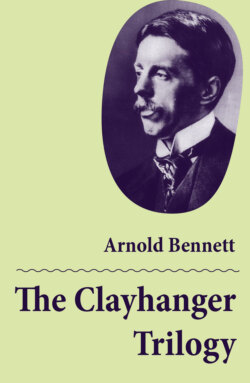Читать книгу The Clayhanger Trilogy (Consisting of Clayhanger + Hilda Lessways + These Twain) - Arnold Bennett - Страница 109
На сайте Литреса книга снята с продажи.
Four.
ОглавлениеThey were standing close together in the shop, Janet and Edwin, near the cabinet of artists’ materials. Janet, after her manner at once frank and reassuring, examined Edwin; she had come on purpose to examine him. She had never been able to decide whether or not he was good-looking, and she could not decide now. But she liked the appeal in his eyes. She did not say to herself that there was an appeal in his eyes; she said that there was ‘something in his eyes.’ Also he was moderately tall and he was slim. She said to herself that he must be very well shaped. Beginning at the bottom, his boots were clumsy, his trousers were baggy and even shiny, and they had transverse creases, not to be seen in the trousers of her own menkind; his waistcoat showed plainly the forms of every article in the pockets thereof—watch, penknife, pencil, etcetera, it was obvious that he never emptied his pockets at night; his collar was bluish-white instead of white, and its size was monstrous; his jacket had ‘worked up’ at the back of his neck, completely hiding his collar there; the side-pockets of his jacket were weighted and bulged with mysterious goods; his fair hair was rough but not curly; he had a moustache so trifling that one could not be sure whether it was a moustache or whether he had been too busy to think of shaving. Janet received all these facts into her brain, and then carelessly let them all slip out again, in her preoccupation with his eyes. She said they were sad eyes. The mouth, too, was somewhat sad (she thought), but there was a drawing down of the corners of it that seemed to make gentle fun of its sadness. Janet, perhaps out of her good-nature, liked his restless, awkward movements and the gesture of his hands, of which the articulations were too prominent, and the finger-nails too short.
“Tom reads rather a lot of poetry,” said Janet. “That’s my eldest brother.”
“That might justify you,” said Edwin doubtfully.
They both laughed. And as with Janet, so with Edwin, when he laughed, all the kindest and honestest part of him seemed to rise into his face.
“But if you don’t supply new books any more?”
“Oh!” Edwin stuttered, blushing slightly. “That’s nothing. I shall be very pleased to get it for you specially, Miss Orgreave. It’s father that decided—only last month—that the new book business was more trouble than it’s worth. It was—in a way; but I’m sorry, myself, we’ve given it up, poor as it was. Of course there are no book-buyers in this town, especially now old Lawton’s dead. But still, what with one thing or another, there was generally some book on order, and I used to see them. Of course there’s no money in it. But still... Father says that people buy less books than they used to—but he’s wrong there.” Edwin spoke with calm certainty. “I’ve shown him he’s wrong by our order-book, but he wouldn’t see it.” Edwin smiled, with a general mild indulgence for fathers.
“Well,” said Janet, “I’ll ask Tom first.”
“No trouble whatever to us to order it for you, I assure you. I can get it down by return of post.”
“It’s very good of you,” said Janet, genuinely persuading herself for the moment that Edwin was quite exceeding the usual bounds of complaisance.
She moved to depart.
“Father told me to tell you if I saw you that the glazing will be all finished this morning,” said she.
“Up yonder?” Edwin jerked his head to indicate the south.
And Janet delicately confirmed his assumption with a slight declension of her waving hat.
“Oh! Good!” Edwin murmured.
Janet held out her hand, to be wrung again, and assured him of her gratitude for his offer of taking trouble about the book; and he assured her that it would not be trouble but pleasure. He accompanied her to the doorway.
“I think I must come up and have a look at that glazing this afternoon,” he said, as she stood on the pavement.
She nodded, smiling benevolence and appreciation, and departed round the corner in the soft sunshine.
Edwin put on a stern, casual expression for the benefit of Stifford, as who should say: “What a trial these frivolous girls are to a man immersed in affairs!” But Stifford was not deceived. Safe within his lair, Edwin was conscious of quite a disturbing glow. He smiled to himself—a little self-consciously, though alone. Then he scribbled down in pencil “Light of Asia. Miss J. Orgreave.”
